We review VPNs independently, but we may earn commissions if you buy a VPN via our links.
Private Internet Access Review

Privacy & Logging Policy
Proven No-Logs VPN Service
Here’s a table summarizing the information that PIA logs:
| Data Type | Logged by Private Internet Access |
|---|---|
| Account Information | Yes |
| Browsing Activity | No |
| Date of Last Connection | No |
| Device Information | No |
| DNS Queries | No |
| Individual Bandwidth Usage | No |
| Individual Connection Timestamps | No |
| ISP | No |
| Number of Simultaneous Connections | No |
| Originating IP Address | No |
| VPN Server IP | No |
| VPN Server Location | No |
You can read PIA’s full privacy policy on its website.
PIA VPN’s privacy policy states outright that all user activity is “NOT recorded, logged or stored at all.”
All Private Internet Access collects is your email address and payment details at sign-up, which is standard practice.
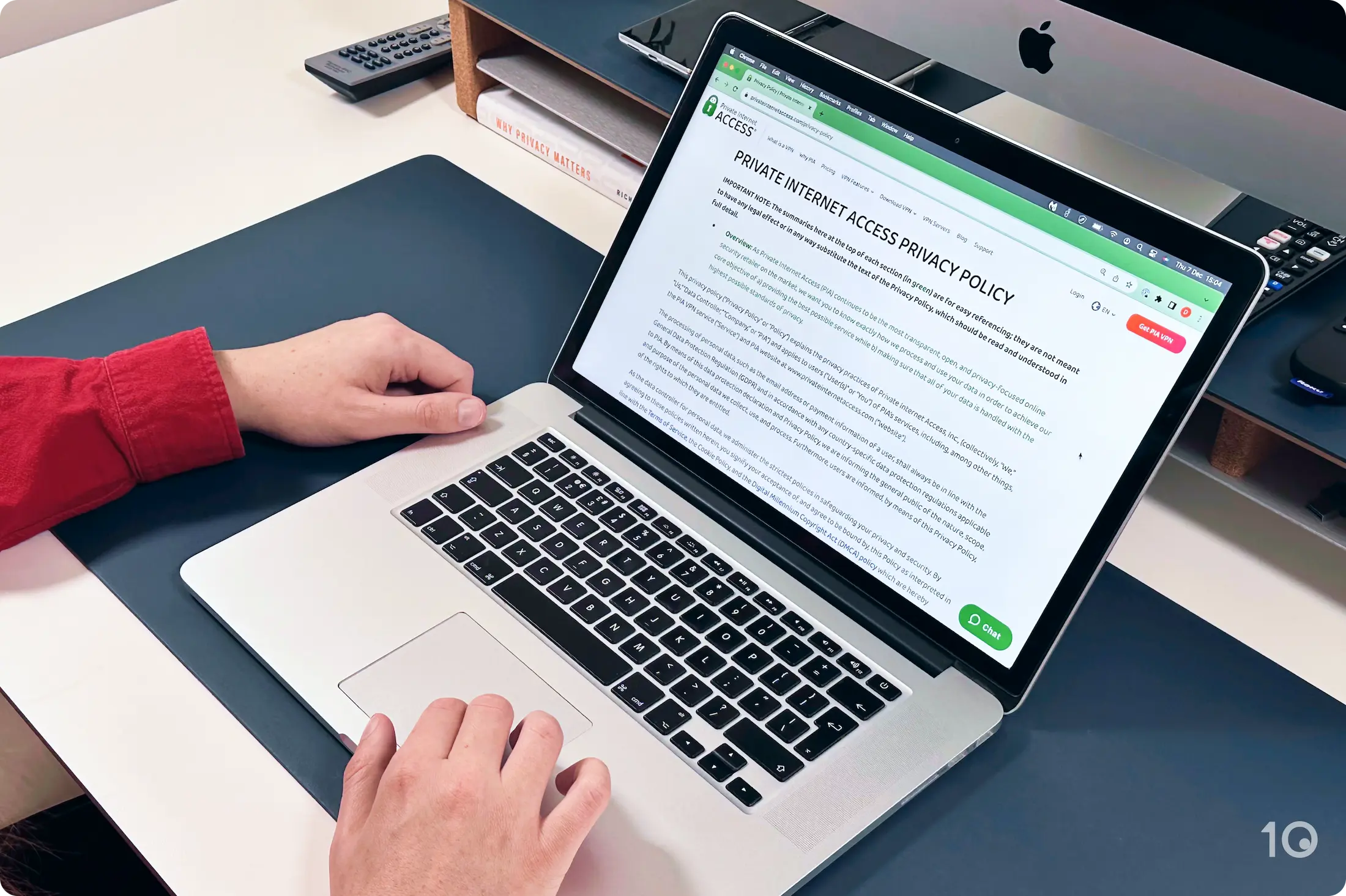
PIA’s Privacy Policy confirms it doesn’t collect your browsing history, IP address, or connection timestamps.
This alone would make PIA one of the best VPNs for privacy, but it’s what it does outside of its logging policy that makes it so trustworthy. Here’s an overview:
Regular Transparency Reports
PIA also releases regular transparency reports that detail the number of requests for data it has received from government agencies, along with how many it has complied with (as of August 2024: zero).
Server Seizures
PIA’s no-logs policy has been externally verified on several occasions.
The FBI subpoenaed PIA in a 2016 court case, but despite receiving an official data request, PIA simply had no information to hand over.
The Russian government also seized PIA servers in 2016 but did not find any retained connection or activity data.
PIA subsequently removed all of its Russian VPN servers in protest to this incident. A bold move we want to see more VPN service providers follow.
As well, the VPN’s no-logs policy claims have been audited as recently as August 2022. Deloitte, the auditor, found that no details that could be used to identify PIA users are stored on the VPN’s servers.
These court cases are real-world tests supporting the company’s logging claims — the best form of proof a VPN can provide. Altogether, this makes PIA the best no-logs VPN on the market.
Based in Privacy-Unfriendly US
PIA is headquartered in the United States, which is widely considered to be one of the worst places to base a VPN company.
The US is a founding member of the Five Eyes (FVEY) intelligence alliance, which has automatic systems in place to collect and share surveillance data with Australia, Canada, New Zealand, and the UK.
The Patriot Act also gives US authorities sweeping powers to collect and retain data, especially through the use of National Security Letters.
Normally we’d advise you not to use a VPN based in a Five Eyes country like the US. However, a verified no-logs policy offsets most of the issues posed by it.
After multiple real-world verifications, we are confident that PIA’s privacy policy and logging practices can withstand its privacy-unfriendly jurisdiction, and you can trust this VPN with your data.
Who Owns Private Internet Access?
In November 2019, Kape Technologies acquired Private Internet Access from London Trust Media Inc. (LTMI), a company with an established history in creating privacy tools, including PIA VPN in 2010.
At the time, the acquisition of PIA garnered some controversy.
The bulk of the backlash stemmed from Kape’s past activities in the advertising space when it was known as Crossrider. We discuss more about this in our CyberGhost VPN review.
On the whole, PIA VPN has always gone above and beyond to champion digital privacy, and there’s no reason why you shouldn’t trust this established VPN.
Equally, Kape is determined to move on from its Crossrider days and is doubling down on its commitments to privacy and internet security. It now operates several trustworthy VPN services, including ExpressVPN and CyberGhost.
How Private Is Private Internet Access Compared to Other VPNs?
In the table below you can see how PIA compares to five other private VPNs in key areas, like their logging policies and jurisdictions:
Speed
One of the Fastest VPNs on the Market
We connected to PIA servers across six different continents from our testing location in New York, US. We use a 100Mbps internet connection, similar to what your baseline speed at home might be.
Here are PIA’s full speed test results:
Testing PIA’s speeds, we recorded a speed loss of just 95Mbps on short-distance connections — an incredibly fast result.
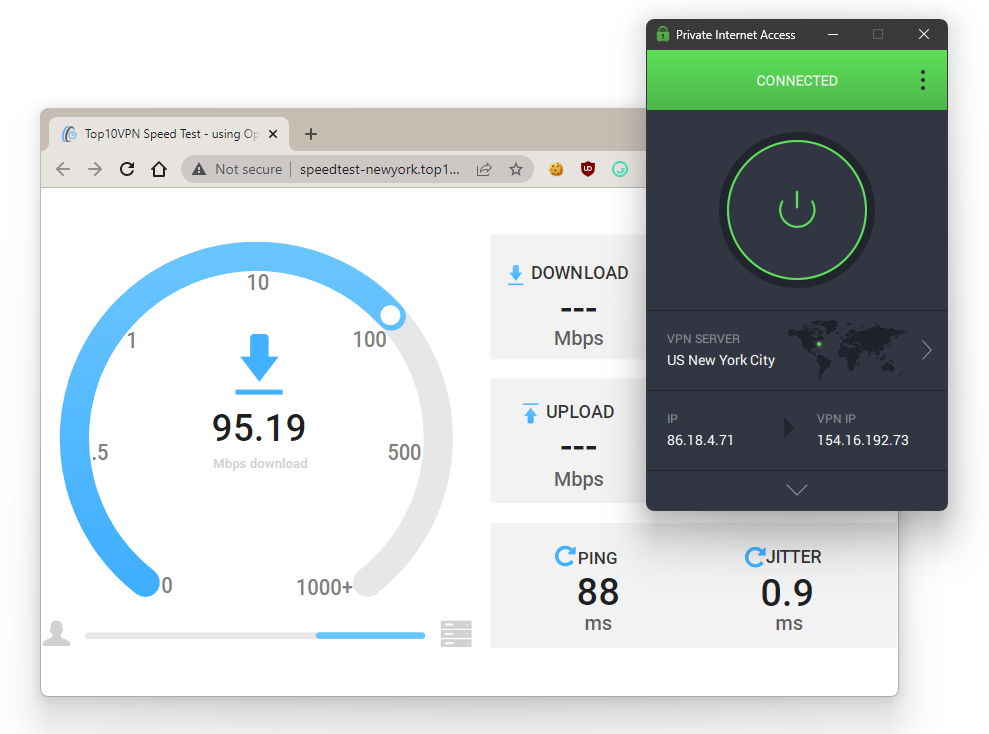
We conduct every speed test using our own purpose-built tool to ensure consistency.
Its long-distance connection speeds were less impressive, but still fast enough for streaming, torrenting, and web browsing.
As expected, the servers located furthest from our testing base in the US recorded the largest speed losses.
However, even over the longest possible distances PIA is still quick. If you need to connect to the other side of the world then you can count on PIA to affect your download speeds as little as possible – we still routinely hit speeds of 82Mbps when connected to a server in Australia.
The main issue which arose in our speed testing with PIA is that it lacks the consistency of some of its fastest rivals. There can be big swings from week-to-week, which holds it back – but only slightly.
There are still faster VPN services than PIA, mainly over long-distances. In our Hotspot Shield review we highlight the VPN’s exceptional global speeds, for example. However, as you can see above, PIA matches or outperforms plenty of big VPN names.
EXPERT ADVICE: To get the fastest speeds with PIA, connect to a server using the ‘Choose Automatically’ option.
PIA Has Ping Times Low Enough for Smooth Gaming
We also measure ping times while testing VPN speeds, and PIA impressed us. You can leave PIA connected while gaming and you shouldn’t notice any difference to your gameplay — not just when connected to a nearby server, but also if you’re connected to a server in another country.
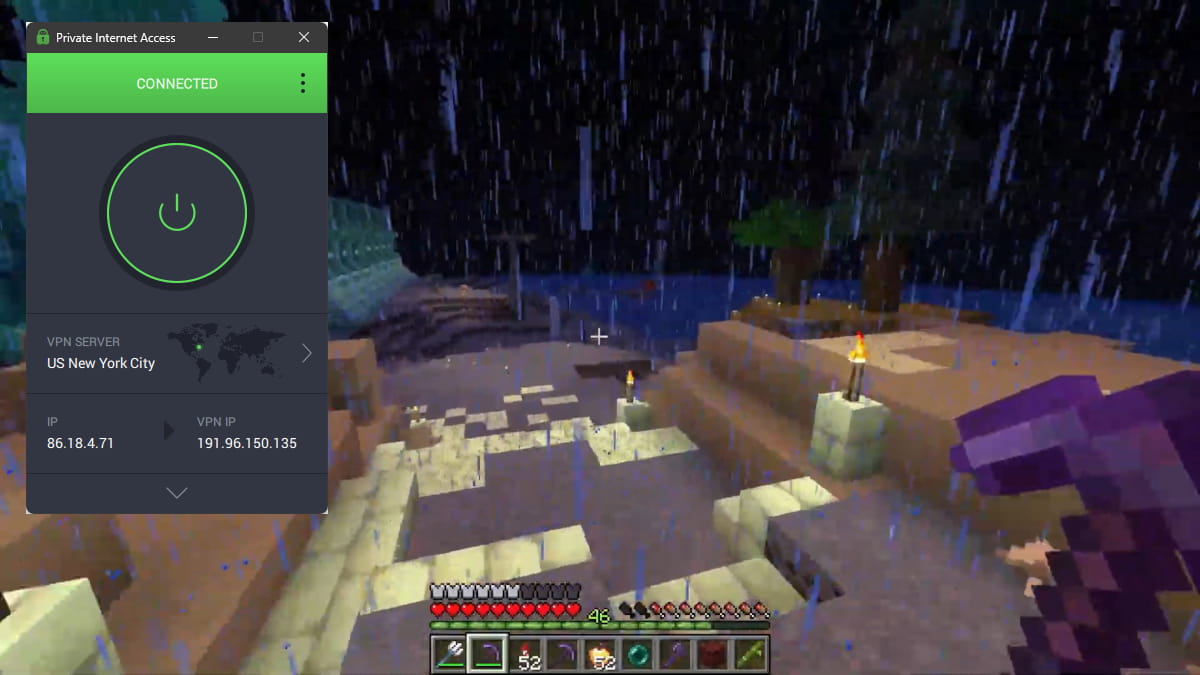
We could play on a shared Minecraft server with PIA running and it didn’t affect our gameplay at all.
PIA put up a ping of 6ms when connected to a server in the same city as us — totally unnoticeable versus a ping of 4ms with no VPN on at all.
If you like to play games like World of Warcraft or League of Legends on servers in a different region to your own, PIA is still a great choice: it only raised our ping to 6ms when we were connected to the UK (3,500 miles away).
Streaming
Exceptional for Streaming Netflix & Other US Services
Here’s a list of streaming services that PIA currently unblocks:
| Streaming Platform | Works with Private Internet Access |
|---|---|
| Amazon Prime Video | Yes |
| BBC iPlayer | Yes |
| Channel 4 | Yes |
| Disney+ | No |
| Hotstar India | Yes |
| Hulu | Yes |
| ITVX | Yes |
| Max | Yes |
| Netflix US | Yes |
Although Netflix’s strong geo-restrictions stop many VPNs from working with the service, Private Internet Access streams Netflix with ease.
For the most reliable performance, connect to one of its ‘Streaming Optimized’ servers present in a number of countries, including Australia, Italy, and Sweden.
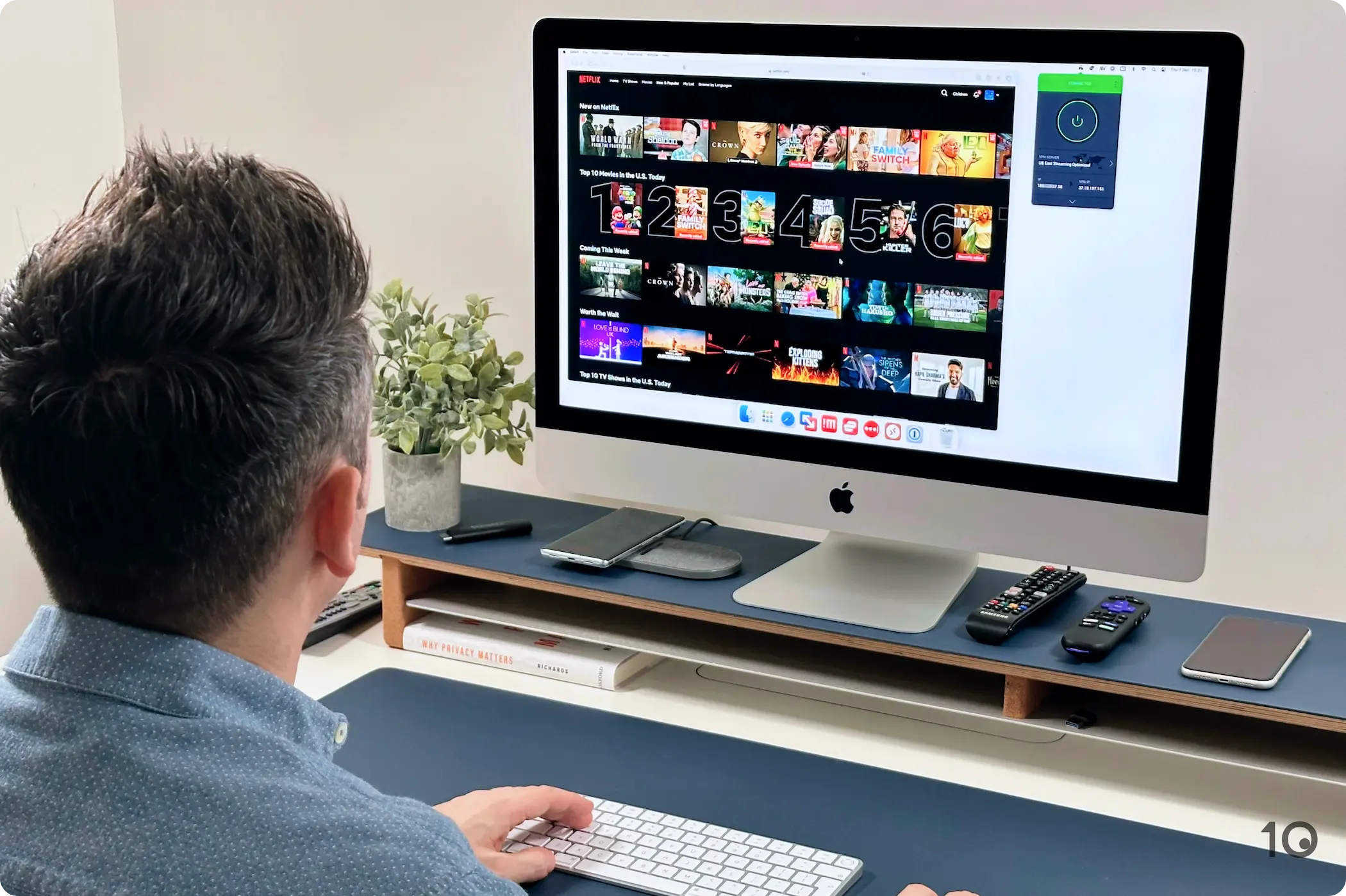
Private Internet Access consistently works with US Netflix
Here are the 6 Netflix regions that PIA was able to unblock in our latest round of testing:
- Australia
- India
- Italy
- Sweden
- UK
- US
Having said that, our ExpressVPN review and Windscribe review detail how both VPNs are more effective at bypassing Netflix geo-blocks around the world.
PIA Streams UK Video Content
We also tested the “UK London-Streaming” server, and Private Internet Access unblocked BBC iPlayer every time.
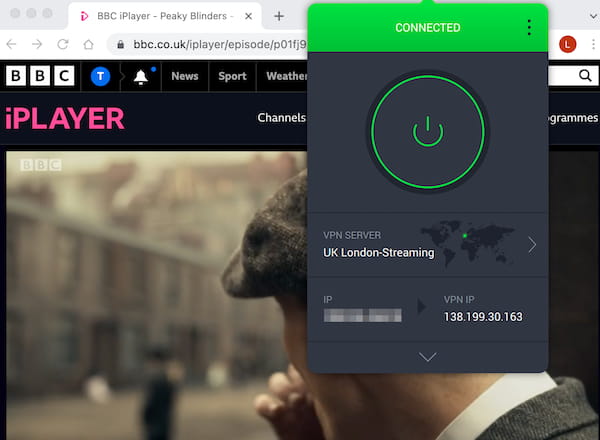
In our tests, PIA worked with BBC iPlayer on its London streaming server.
For the time being, we can safely say that PIA now consistently works with all UK streaming services, including ITVX and Channel 4.
PIA Unblocks Amazon Prime Video, Hulu & HBO Max
Our tests found PIA VPN is one of the best VPNs for Hotstar, and it also works with many other content platforms including Hulu, HBO Max, and Amazon Prime Video.
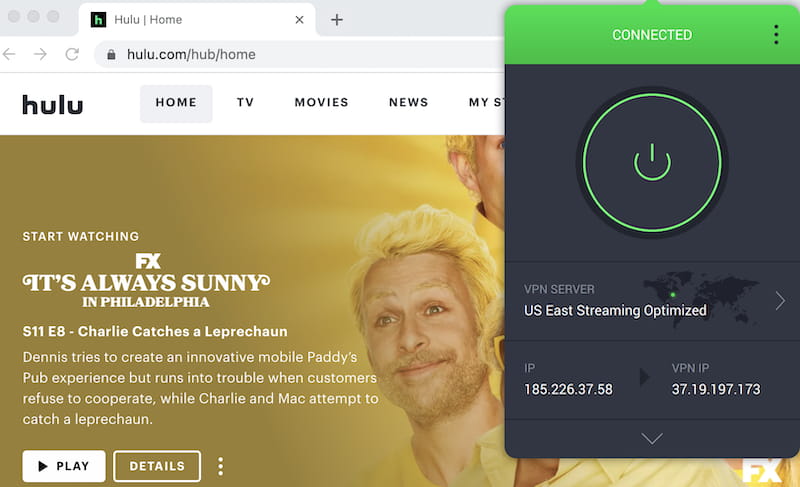
Private Internet Access works well with Hulu
On top of this, PIA’s fast speeds mean you won’t experience any lag when streaming shows in HD or 4K.
When we consider what PIA does best, it’s not historically been a top VPN for streaming. However, its recent performance in our tests has been fantastic.
Thanks to its large VPN server network, it’s even begun to outperform more established streaming VPNs. For instance, it’s our top choice for watching Champions League games for free from LiveScore Ireland and for watching blackout NHL games.
PIA’s Streaming Performance Compared to Other Top VPNs
The table below compares Private Internet Access to other streaming VPNs based on Netflix and BBC iPlayer access, and whether streaming with Smart DNS is available:
Torrenting
PIA Is an Excellent VPN for Torrenting
PIA is the best VPN for torrenting out of all 62 VPN services we’ve tested. It allows P2P and file-sharing activity on all of its servers, which we love when compared to so many of its competitors which exclude servers for seemingly no reason.
PIA is compatible with all popular torrent clients including Deluge, uTorrent, and Transmission. We test using qBittorrent.
MACE, PIA’s built-in ad blocker, can also help block any trackers or malware you come across in the process.
In our P2P tests, we were able to successfully torrent on all PIA’s servers. You can torrent from any server location, with no bandwidth or other limits. Simply connect to your nearest VPN server and start downloading.
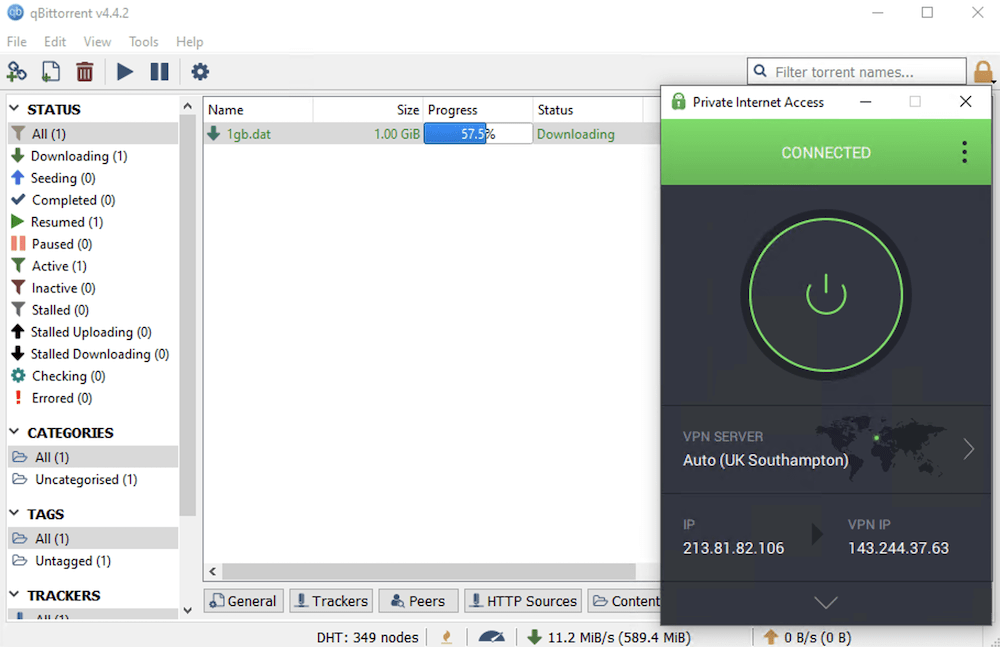
We were able to download a torrent file very quickly using PIA VPN.
Using PIA, we downloaded a torrent file at a rate of 9.6MiB/s. This is one of the fastest results we’ve measured, beating other top VPNs like ExpressVPN and NordVPN.
There’s no throttling and no bandwidth restrictions — torrents downloaded almost as fast as they did with no VPN connected at all.
PIA Has an Impressive Port Forwarding Tool
PIA’s port forwarding feature redirects incoming connections to bypass any NAT firewall.
Port Forwarding lets you increase the number of torrenting peers you can communicate with, and drastically improves P2P upload speeds. The PIA settings let you forward to ports 443, 80, 110, 53, 8080, and 9201.
PIA’s VPN Kill Switch Is Reliable & Effective
All PIA apps come with a VPN kill switch to protect your traffic if your internet connection suddenly drops.
This is especially important when torrenting files. Without a working kill switch, your real IP address would be visible to everyone in the event of a VPN connection failure. In our testing it worked every time.
Price & Value
Cheap, Great-Value VPN with a 30-Day Refund Policy
Three billing options allow you to sign up to Private Internet Access for one month, one year, and two years.
Monthly
$11.99/mo
Billed $11.99 every month6 Month(s)
$7.50/mo
Billed $45.00 every 6 months28 Month(s)
$2.03/mo
Billed $56.94 the first 28 months and yearly thereafter
The best monthly prices are reserved for the longer-term plans. While they’re great value, be aware that you do have to pay the whole amount up-front.
Not only is PIA the #3 rated VPN on our entire website, but it’s also one of the absolute cheapest. Its value for money is almost unbeatable when you consider the suite of utilities and excellent performance you get with it – and with the recent decision to allow an unlimited number of devices per account, it’s only getting better.
Payment & Refund Options
Here’s the payment methods that PIA accepts:
American Express
Bitcoin
Bitcoin Cash
Mastercard
PayPal
UnionPay
Visa
You can even use gift cards, which can be purchased anonymously with cash. This is a good range of methods, particularly if you want the utmost privacy – cryptocurrency and gift card payments for VPNs aren’t as common as we think they should be.
30-Day Money-Back Guarantee
PIA doesn’t have a free version, but you can get a seven-day free trial if you create your account on the App Store or Google Play.
If you do it through the website, you’ll be eligible for a 30-day risk-free money-back guarantee instead.
To cancel your subscription within the first 30 days, simply open a ticket with the PIA support team and ask for a full refund.
How Expensive Is Private Internet Access Compared to Other VPNs?
Use the table below to compare PIA’s pricing information to other popular VPNs. You’ll find details about each VPN’s cheapest price, refund policy, and free trial period:
Alternatively, if you would like to buy a VPN subscription for a one-off fee of $20, we have a list of the best lifetime VPNs available, too.
Server Locations
PIA Has a Huge Network of VPN Servers
The benefit of PIA’s huge server network is that it minimizes server load and increases the chances you’ll connect to a reliable and close-by server. Here’s how its locations are spread around the world:
| Continent | Number of Countries |
|---|---|
| Europe | 45 |
| Asia | 22 |
| South America | 9 |
| North America | 8 |
| Africa | 5 |
| Oceania | 2 |
The majority of PIA’s servers are in Europe and North America. This wide US coverage makes PIA the best VPN to stream blackout NHL games. But the spread elsewhere is also impressive. In practice, wherever you’re located you’ll be able to connect to a nearby PIA servers.
This makes PIA an excellent VPN for connecting to specific countries. For example, it’s the best VPN for getting a US IP address because it offers the largest number of US IP addresses. It also has the most Argentina and Canada servers, making it the best VPN for getting an Argentina IP address and for accessing Canadian websites.
You can see how Private Internet Access’ server network compares to other VPN services in the table below:
| VPN Service | No. Of Servers | No. Of Countries | Average No. Of Servers Per Country |
|---|---|---|---|
| PIA | 18,651 | 91 | 205 |
| CyberGhost | 12,000 | 100 | 107 |
| NordVPN | 6,328 | 111 | 57 |
| IPVanish | 2,200 | 53 | 42 |
| ExpressVPN | 3,000 | 106 | 28 |
| HMA | 1080 | 195 | 6 |
In turn, this boosts PIA’s speed, with an average speed loss of 5% on local connections. You can read more about the VPN’s speed performance in the dedicated section of this review.
Dedicated IP Addresses
PIA also offers dedicated IP addresses.
This IP address is unique to you and remains the same every time you connect. Australia, Belgium, Canada, Germany, Sweden, UK, and the US are the only available locations, and it costs an extra $5.00 per month.
Disappointingly, this doesn’t work with any streaming sites. Reliable streaming performance is usually one of the main benefits of purchasing a static IP address.
Instead, PIA’s dedicated IP feature is meant for accessing sites that require a whitelisted IP address. For example, to access online banking.
With such a limited use case, we recommend you avoid this feature unless you have a specific reason for using it.
Virtual Server Locations
Private Internet Access only uses bare-metal (physical) servers, but 41% of its server locations are virtually located.
PIA clearly labels its virtual server locations with a globe icon. They can be disabled by toggling off ‘Include Geo-Located Regions’ in the apps’ settings.
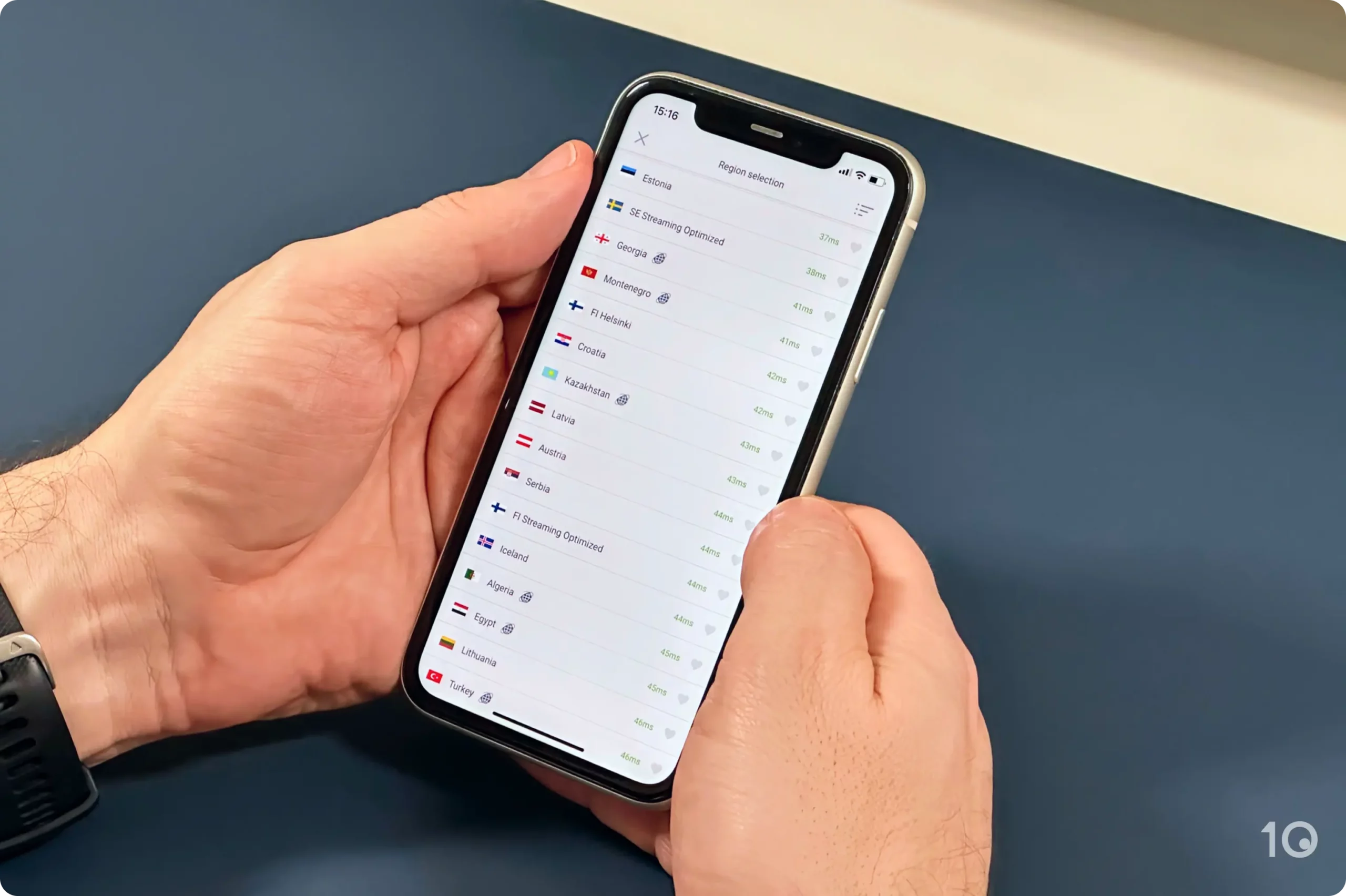
A virtual server location assigns you an IP address in your chosen location, even if the physical server is located elsewhere. This allows VPN companies to offer IP addresses in countries where it’s very hard to operate a physical server.
They can also improve speeds if the physical server is closer to your real location than the IP address you’re assigned. However, if the physical server is further from your physical location than advertised, performance may also drop significantly.
Using virtual server locations isn’t a problem if done properly. PIA’s clear labeling of these servers, alongside allowing you to disable them entirely, is a good level of transparency.
Rented but Secure VPN Servers
We contacted a PIA representative who confirmed Private Internet Access rents almost all its VPN servers. We were told:
“The majority of our servers, if not all of them, are rented from third parties.”
They also informed us that PIA uses a “stringent vetting process” for these third parties.
Most VPN companies rent some of their servers from data centers around the world. This helps provide you with access to a global network, but also means you are forced to trust an additional party with your data.
Generally speaking, rented servers are not an issue if the VPN provider takes the time to audit all installed hardware along with the network environment it is operating in.
We asked PIA to explain its vetting process and how it can guarantee compliance from third parties. PIA chose not to respond.
It is not unusual for a VPN service to rent its hardware. That said, given its security-focused reputation, we expected PIA to be more transparent about its server ownership and its vetting process. Hopefully it can improve on this in the future.
Security & Technical Features
Strong Security, Open Source Apps & a Great Range of Features
| Protocols | Available in Private Internet Access |
|---|---|
| IKEv2/IPSec | No |
| OpenVPN (TCP/UDP) | Yes |
| WireGuard | Yes |
| Encryption | Available in Private Internet Access |
|---|---|
| AES-128 | Yes |
| AES-192 | No |
| AES-256 | Yes |
| Blowfish | No |
| ChaCha20 | Yes |
| Security | Available in Private Internet Access |
|---|---|
| Diskless Servers | No |
| DNS Leak Blocking | Yes |
| First-party DNS | Yes |
| IPv6 Leak Blocking | Yes |
| Supports TCP Port 443 | Yes |
| VPN Kill Switch | Yes |
| WebRTC Leak Blocking | Yes |
| Advanced Features | Available in Private Internet Access |
|---|---|
| Ad Blocker | Yes |
| Dedicated IP | Yes |
| Double VPN | Yes |
| SOCKS | Yes |
| Split Tunneling | Yes |
| Static IP | Yes |
| Tor over VPN Server | No |
| Tracker Blocker | Yes |
PIA supports OpenVPN, WireGuard, IKEv2, and L2TP/IPSec protocols with the option to choose between UDP and TCP connections.
The default setting protects your connection with AES 128-bit encryption, but we recommend you select the AES-256 cipher in the settings interface, or switch protocols to WireGuard.
There is built-in protection against IPv4 and IPv6 leaks, DNS leak protection, and a VPN kill switch on all platforms.
Our tests detected no IP, DNS, or WebRTC leaks in any application.
Operates Private DNS Servers
PIA also owns and operates its own private DNS servers, which means your DNS requests are resolved by Private Internet Access rather than your ISP. That means that no third parties get to see what websites you visit — it’s all handled by PIA from start to finish.
The apps are flexible, too – the Windows client can be set to use any custom DNS of your choice.
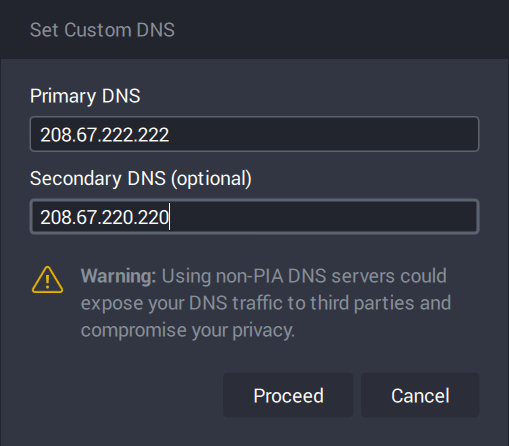
For extra security, PIA controls its own network of DNS servers.
Highly Customizable Encryption
Unlike a lot of VPN services, PIA gives you detailed control over the algorithms and protocols used to encrypt your data.
Adjusting your encryption settings is useful for optimizing performance and configuring the VPN to suit your security needs, but it might be overwhelming for some beginners.
The default settings protect your connection with OpenVPN and AES 128-bit encryption. You can step up the encryption type to AES-256 (CBC or GCM) in the settings menu.
You can also choose the encryption level used for data authentication and the VPN handshake. These processes allow your device and the server it is contacting to verify the authenticity of the connection and the data being transmitted.
The default settings are for RSA-2048 and SHA-256, but you can go all the way up to RSA-4096 and SHA-384.
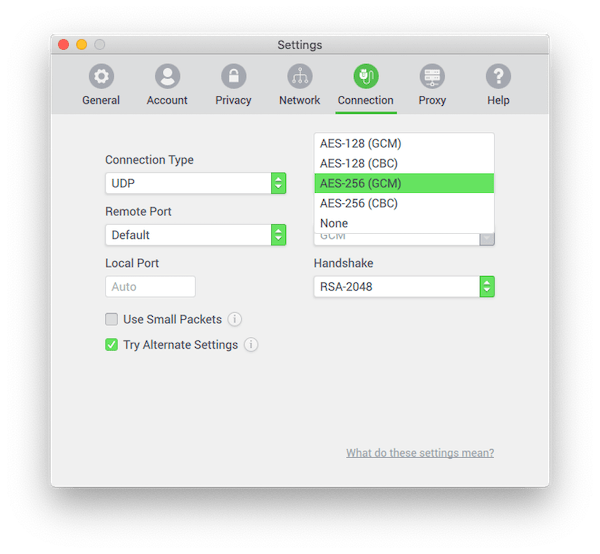
The PIA app allows you to fine-tune your encryption and security settings.
The most secure settings aren’t selected by default, though, so we recommend changing them to the following configuration:
- VPN Protocol — WireGuard
- Local Port — Auto
- Connection Timeout — 1 minute
- MTU — Auto
Unique Advanced Security Features
Private Internet Access also comes with a range of advanced security features designed by the VPN itself — you won’t find them anywhere else, although some of them are similar to features other VPNs offer.
PIA’s advanced features include an ad-blocker (PIA MACE), a private browser (InBrowser), and SOCKS5 encrypted proxy. Here’s what all that means:
Custom Ad & Tracker Blocker: PIA MACE
PIA MACE is a DNS-based malware and ad blocker found in the ‘Privacy’ section of the app’s settings. This feature blocks access to domains that are commonly known to host ads, trackers, and malware.
MACE isn’t a great ad blocker. You can’t white list certain domains, or adjust the filter settings: it is simply On or Off.

The Private Internet Access app includes an ad blocker.
The inability to whitelist certain URLs means you have no choice but to keep the feature on, which ends up breaking certain websites.
Our testing also showed that MACE isn’t perfect but is still one of the best VPN ad blockers we’ve tested, even with the issues that have been reported by PIA users.
Private Mobile Browser: InBrowser
InBrowser is a private browser for iOS and Android. It offers a permanent private browsing experience that deletes your history, cookies, and session data every time you exit the app.
Obfuscation: Shadowsocks Protocol
Shadowsocks is an open-source encrypted proxy that can be selected directly from the app’s interface.
Also known as SOCKS5, Shadowsocks’ speeds make it a favorite of torrenters and anyone looking to bypass internet censorship.
Users will require a different username and password to use the SOCKS5 proxy, which can be generated from the Client Control Panel.
Open-sourced Apps
All of PIA’s desktop applications, mobile clients, and browser extensions are open-source.
This means that absolutely anyone can view their source code, study how the apps are written, and contribute themselves by fixing errors and making code improvements. It’s definitive proof that the apps do what they say they do, and there’s no nasty hidden bits of code inside them.
Other VPN services such as ProtonVPN and IVPN have chosen to open-source their apps. It’s still quite rare among VPNs, but we’d encourage them all to do it.
Leak Test Results: PIA Does Not Leak Your Data
PIA comes with built-in protection against IPv4, IPv6, and DNS leaks. DNS leak protection is enabled by default on the macOS app, but has to be manually enabled on the Windows app.
We can confirm that the desktop and mobile apps do not leak. We tested for IP, DNS, and WebRTC leaks, and our real IP address in London was consistently protected.
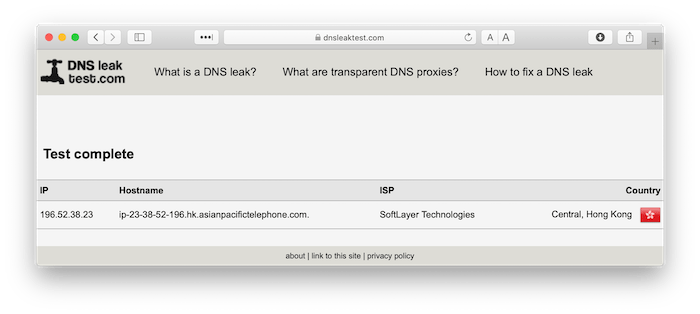
PIA’s VPN apps concealed our true IP address.
All of these features combine to make PIA one of the safest, most advanced VPNs we’ve tested. It’s a VPN that lives up to its reputation for security and anonymity, and we’re very pleased at how consistently its maintained such a high standard in our testing over the years.
Additional Security Features We’d Like to See
- IPv6 support. If you have an IPv6 address, PIA will successfully hide it – however it will not replace it with a spoofed address like it does with IPv4. We’d like to see it change that to reduce the risk of IPv6 leaks in the future.
- GPS spoofing is something not many VPNs can do, but if PIA were to introduce it then it would dramatically improve its ability to hide your true location while on mobile.
- Whole-network server ownership. PIA rents so many servers, it would be a great reassurance for security if it decided to switch to a network it wholly owns.
Bypassing Web Censorship
PIA Works in China - but Not Always
We test PIA VPN’s access in China weekly, using our test Shanghai server. We connect to it remotely from our test office to see if PIA can genuinely unblock websites inside China.
Over the past three months, PIA has recorded an uptime of 50% in China. That’s not quite reliable enough to make it one of the best VPNs for China, but it sits just outside of the top five.
To bypass the Great Firewall with PIA, use the OpenVPN protocol and enable the Shadowsocks proxy within the app’s settings.
Watch us using PIA to access blocked websites in China in the video below.

We accessed censored websites in China using PIA 32% of the time.
PIA’s Shadowsocks Beats Censorship
PIA uses Shadowsocks, which is a third-party proxy developed specifically for use in China.
Although Shadowsocks is not as safe or effective as proprietary VPN obfuscation tools, it can access popular apps and websites like Instagram, Facebook, Gmail, and WhatsApp.
Device & OS Compatibility
PIA Has Apps for All Popular Devices
Apps
Private Internet Access can be used on the following platforms:
Windows
Mac
iOS
Android
Linux
Router
This is the complete suite of apps, and exactly what we’d expect to see from a top VPN. The fact that you can use PIA to cover every single one of them, all at once, with only one account, is a huge bonus.
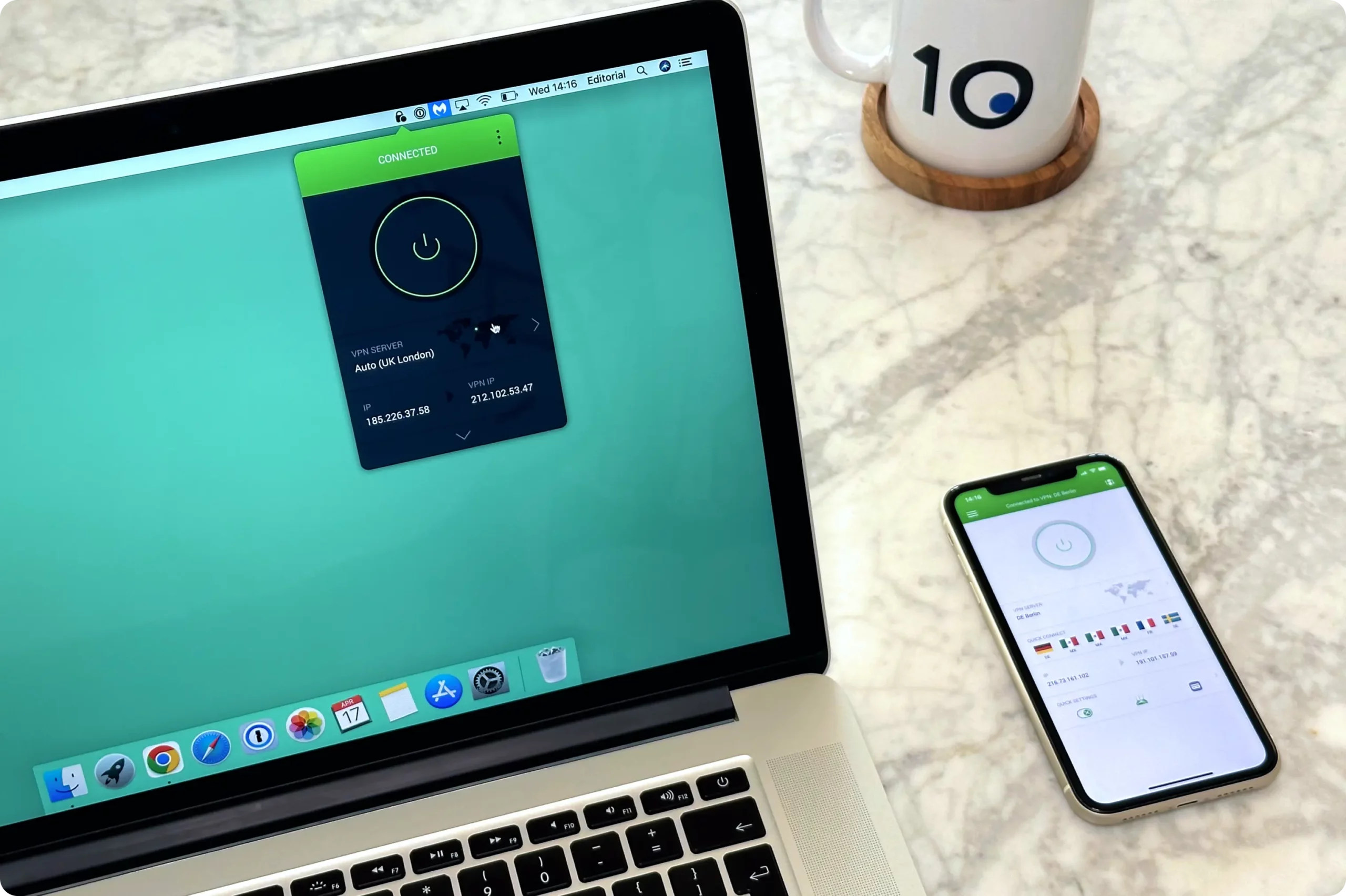
PIA can also be installed on DD-WRT, Merlin, Pfsense, and OpenWRT/LEDE routers. However it doesn’t have a bespoke router app like ExpressVPN, and its performance while doing so is limited. Setup is slow and it’s not very intuitive to use – we don’t recommend using PIA at router level (and neither does PIA itself).
Games Consoles & Streaming Devices
If you do choose to install PIA on your router, you can use it with the following devices:
Apple TV
Amazon Fire TV
Android TV
Chromecast
Nintendo
PlayStation
Roku
Xbox
PIA’s Smart DNS feature will also work to change your IP address on these devices, but it won’t encrypt any of the traffic traveling to or from them.
Browser Extensions
Private Internet Access has browser extensions on the Chrome and Firefox web stores. It can also be installed on Edge and Opera browsers by visiting the Chrome Web Store – we’ve tested it ourselves and it works on both platforms.
Chrome
Microsoft Edge
Firefox
Opera
These extensions let you connect to a PIA VPN server directly from your browser’s interface, hiding your IP address and securing your traffic with Squid HTTPS.
Remember that VPN browser extensions only encrypt browser traffic, and will not secure the rest of your computer’s activity. If you want to encrypt and protect all your web traffic, use full VPN software.
We love that PIA’s extensions work on almost every browser (Safari is the only big name missing), as so many VPNs either overlook this or create an extension that simply doesn’t work. It’s definitely one of the best options if you prefer browser VPNs to using the full app.
Ease of Use
User-Friendly Interface, but Can Feel Overwhelming
In the section below we take a closer look at each PIA VPN client so you know what to expect from the VPN service.
There are a few notable differences between each Private Internet Access app that we’ll explain in detail in the following section. For an overview of the features available on each platform, you can use the table here:
Desktop & Laptop (Windows & Mac)
The Private Internet Access Windows app offers the best balance of performance and features, with the macOS app not far behind.
It is easy to install and immediately opens with a simple interface from which you can connect to your desired server location, access the settings menu, and view your real and virtual IP address.
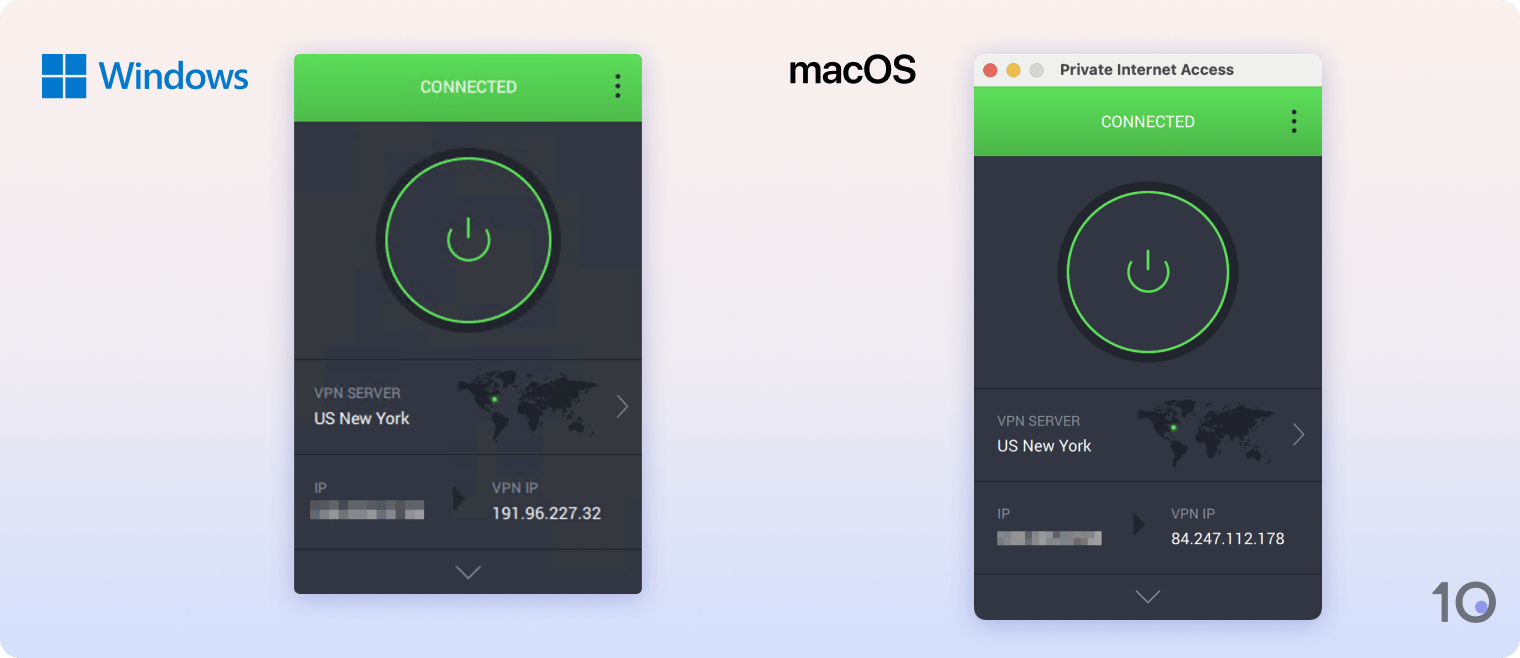
More experienced VPN users can click the downward facing arrow to access a wider array of settings. In this expanded view you can see the amount of data transmitted during your VPN session, activate the VPN snooze feature, and measure your VPN’s performance.
The PIA Windows app comes with a ‘Proxy’ tab in the apps settings, which allows you to redirect your VPN connection through one extra location. You can choose between the Shadowsocks or SOCKS5 proxy options, with multiple locations available.
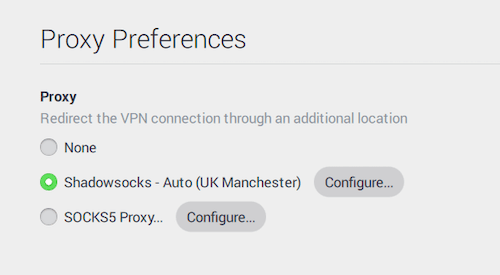
PIA’s Windows app allows you to route your traffic through one additional location.
The app runs in the Windows system tray by default, which means that the client is pinned to the bottom right of your device’s screen. The option to detach the app from the tray is buried in the ‘General’ section of the app’s settings, which is hard to find for most people. We’d like to see this fixed.
There are a couple of minor differences that we think makes the Mac app more frustrating to use than the Windows client.
Firstly, the PIA Mac app launches as a menu bar app by default. This means that the app cannot be conveniently placed in the dock or launched from Spotlight. Even when detached from the menu bar, traditional keyboard shortcuts do not work with the app.
PIA’s macOS application is also very slow to load and operate. When running as a windowed app, the Private Internet Access Mac app takes three seconds to load — it may not sound like much, but it can make using it feel laborious.
Mobile (Android & iOS)
PIA’s Android app is by far the best of its mobile apps, offering advanced VPN features without compromising on simplicity. In terms of looks, though, the Android and iOS apps are almost identical.
The Android app offers a range of configuration options, with more settings than some competing desktop clients.
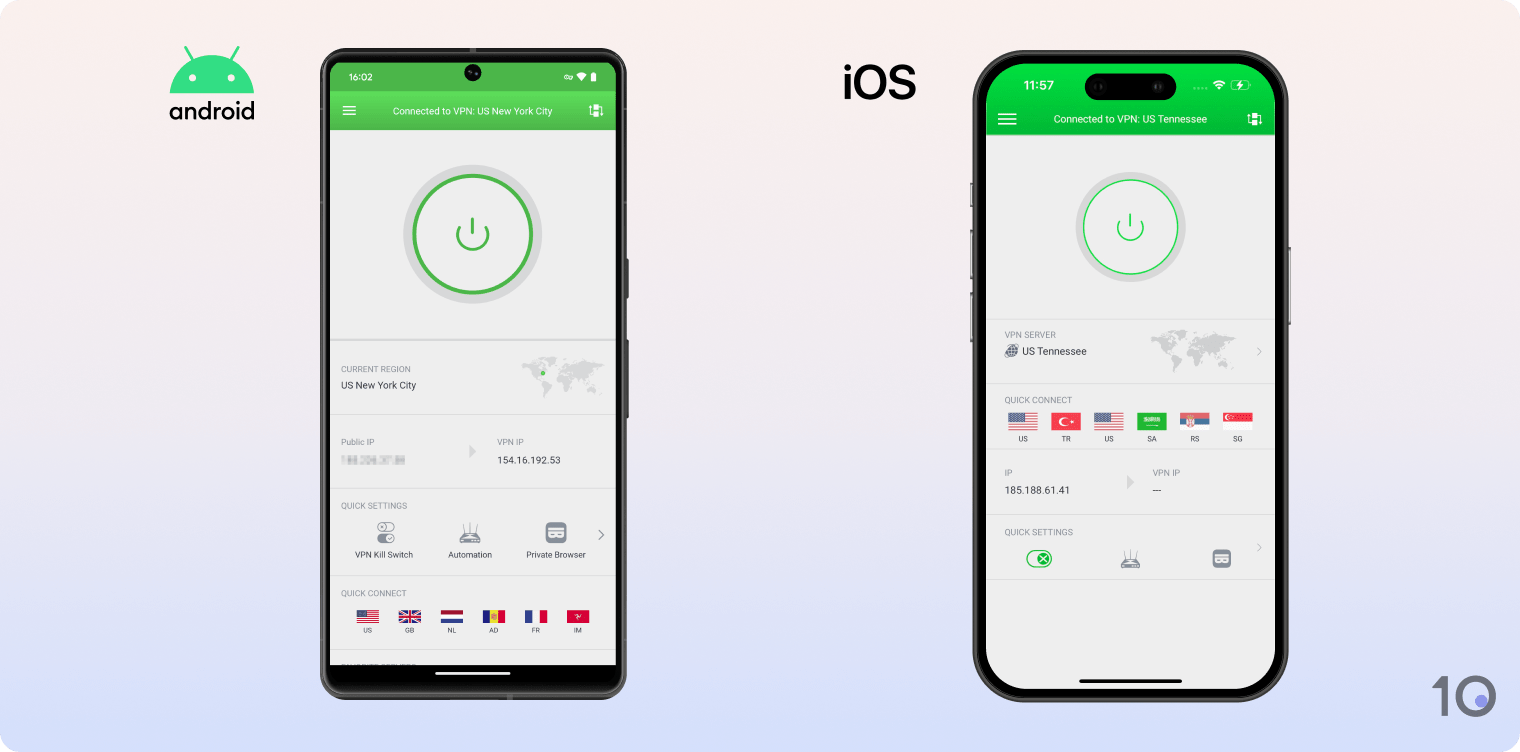
PIA’s mobile apps look almost identical to their desktop counterparts, which is rare.
Tapping your current server location will display a list of other options. Here, a favorites system means your most commonly-used servers will always be at the top of the list.
Android users can choose between TCP or UDP connections, request port forwarding, customize DNS servers, and adjust encryption settings.
The application can be configured to automatically protect you when accessing unknown wireless networks, or turn itself off when you’re using mobile data.
There is also a built-in kill switch, a split tunneling option called Per App Settings, and even an option to set your device to vibrate when you connect to a PIA server.
Due to restrictions enforced by Google, the Private Internet Access app downloaded through the Google Play Store does not come with MACE, PIA’s proprietary ad blocker. It’s also missing from the iOS app.
To get PIA MACE on your Android device you have to download the .APK file directly from the PIA website, where you’ll also find a simple step-by-step setup guide.
While it may have slightly fewer features, the iOS app has the best choice of VPN protocols of all PIA apps, letting you switch between OpenVPN, WireGuard, IPsec, or IKEv2.
We’re delighted to see how many customization options PIA has on iOS — it’s the platform that ordinarily gets left behind the most when it comes to VPNs. You can set a custom port, change your DNS server, alter your encryption settings and enable a VPN kill switch. This exceptional functionality makes PIA one of the best VPNs for iOS devices.
The home screen allows you to quickly connect to recently used server locations and toggle network management settings, including the ability to automatically permit trusted networks.
Both iOS and Android have access to InBrowser, PIA’s private browser for iOS and Android.
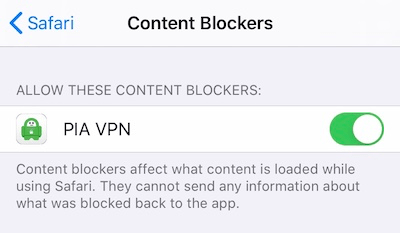
PIA’s iOS app lets you block ads and trackers via its Safari Content Blocker.
Streaming Devices (Fire TV, Apple TV & Android TV
PIA’s apps for Fire TV, Apple TV, and Android TV are attractive and easy-to-use, with a dark mode display for increased legibility on TV screens.
We appreciated the option to favorite locations as it prevented needless scrolling through the server list, particularly on Apple TV.
You won’t encounter any issues connecting to a server or switching settings either, as PIA’s streaming apps follow the same UI as their desktop counterparts.
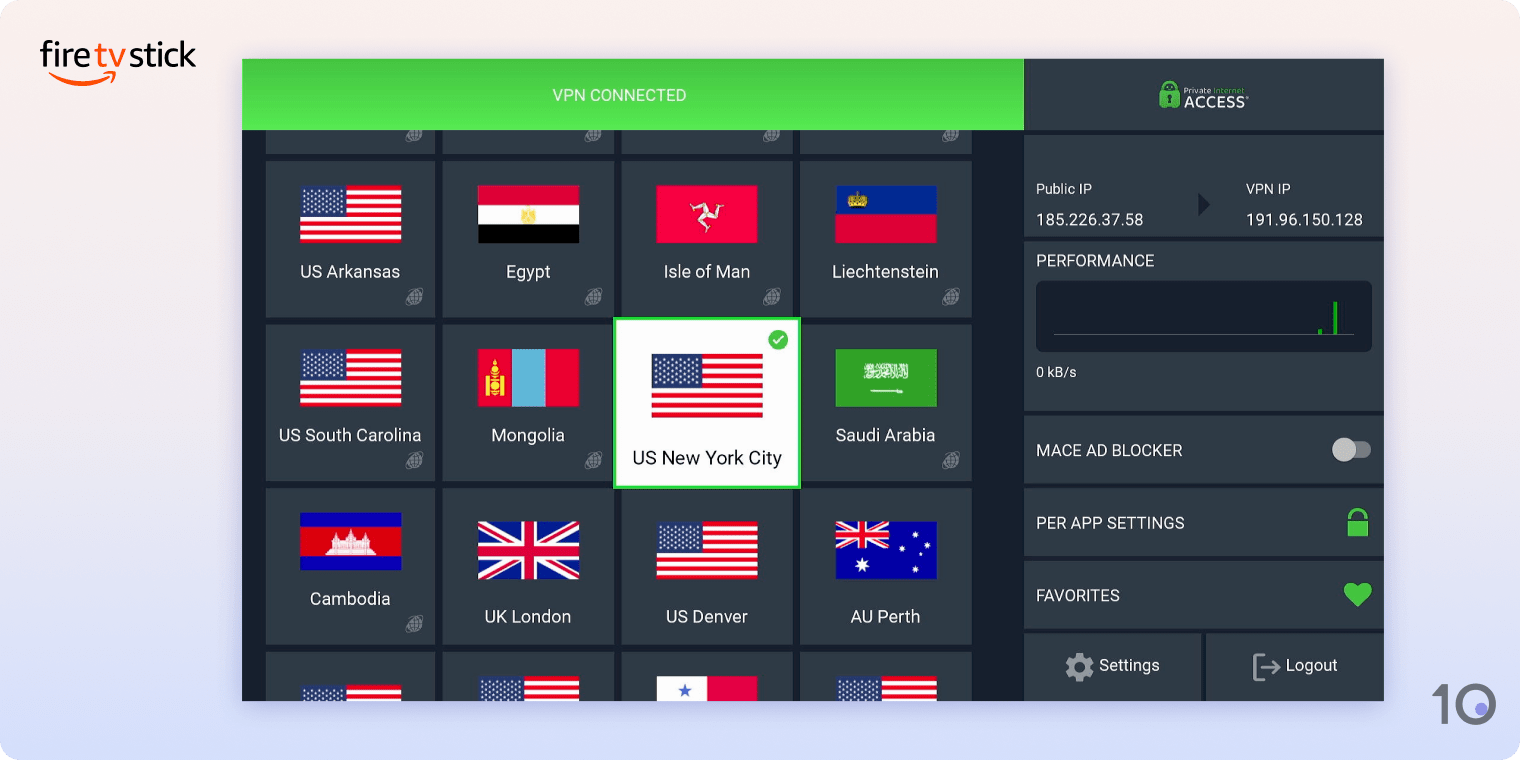
While the streaming apps are user-friendly, we were only able to stream US Netflix on 25% of PIA’s US servers. This is significantly less reliable than the desktop and mobile apps.
PIA’s Broken Smart DNS Tool
Private Internet Access recently introduced a Smart DNS feature, to change your location on devices that don’t let you install VPN apps.
PIA’s Smart DNS tool changes your geo-location to: the US, the UK, Germany, Japan, or the Netherlands. However, when testing it on our Apple TV, we discovered it doesn’t work with any streaming apps.
The Smart DNS tool didn’t unblock Netflix, Prime Video, HBO Max, or Hulu. The screenshot below shows how HBO Max detected the Smart DNS proxy and stopped us accessing the streaming service.
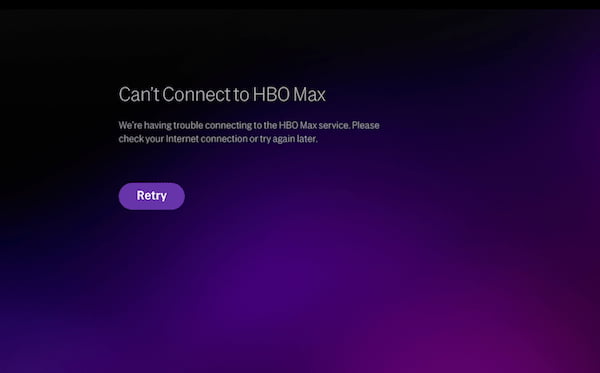
PIA’s Smart DNS tool doesn’t work with streaming apps.
This is one of the only ways to use PIA on things like games consoles and Smart TVs, so the fact that it doesn’t work at all for streaming really disappointed us.
Browser Extensions
PIA’s browser extensions come with many settings to explore, and on balance they work very well.
Bonus privacy features include the ability to prevent websites accessing your location, camera, or microphone, block Flash, and bypass particular websites.
You can also block third-party cookies, website referrers, and trackers. If you’re looking to keep it simple, you can also just choose a location and click Connect.
We strongly recommend enabling ‘Block WebRTC IP Detection’ in the PIA Firefox extension. Otherwise, your IP address will leak through WebRTC due to a privacy vulnerability in the Firefox browser.
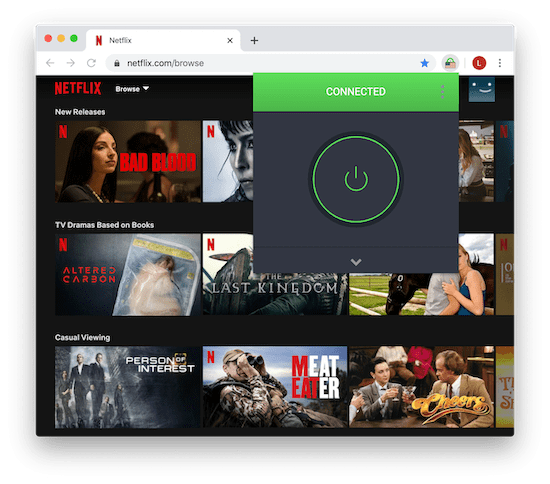
PIA’s browser extensions allow you to stream US Netflix with ease.
Customer Support
Well-Trained Customer Support Available 24/7
| Customer Support | Available in Private Internet Access |
|---|---|
| 24/7 Email Support | No |
| 24/7 Live Chat Support | Yes |
| Chatbot | No |
| Yes | |
| Email Support via Online Form | No |
| Online Resources | Yes |
| Tutorial Videos | No |
Private Internet Access is simple to install and easy to use on all platforms, but you might still require some assistance.
You can get straight into a live chat with a PIA help agent by visiting the PIA website and clicking on the icon in the bottom-right-hand corner of the screen. You are then asked to input your account details, like your email and account ID, before being connected.
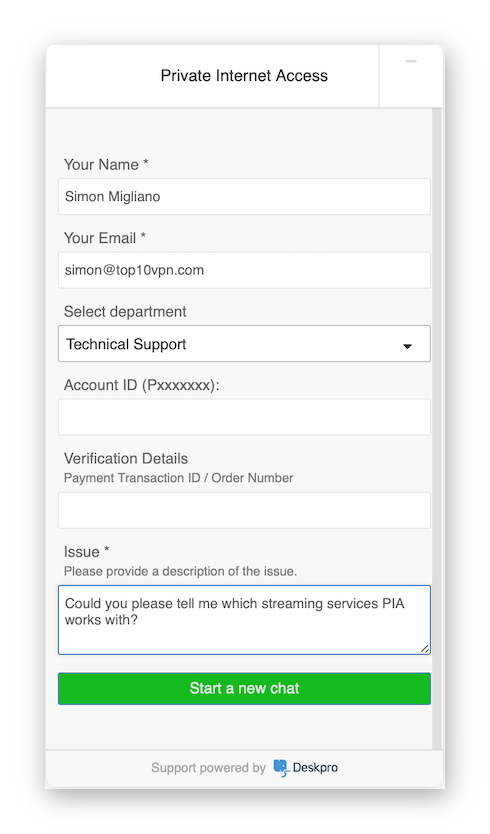
PIA’s verification check allows you to save time and swiftly resolve your query.
It’s great to be able to get help so quickly and with so little information required.
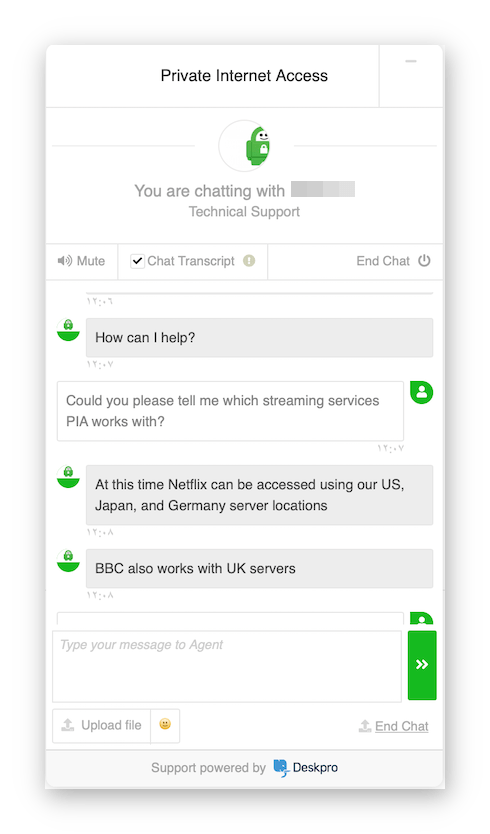
PIA’s knowledgable customer support team was able to answer all of our questions.
PIA also has a large, searchable online knowledgebase with articles covering troubleshooting, account problems, technical complications, and more.
The website’s guides section has articles covering setup and tutorials for all supported platforms. It should cover most general issues you might have with the app.
You can also contact a member of the support staff on the website’s ticket request system. While this system does work and users tend to report positive experiences, you won’t always get a fast reply. It’s also only available from 11 am to 7 pm (EST) on weekdays – we’d like to see this increased to 24/7 in the future.
